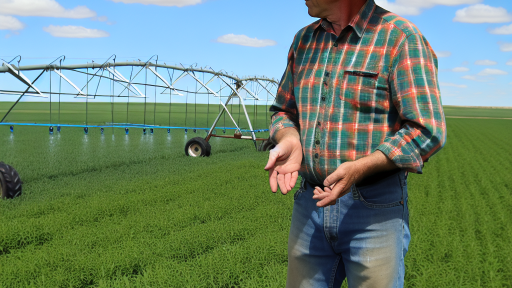Understanding Organic Matter
Definition of Organic Matter
Organic matter consists of decomposed plant and animal materials.
It forms a crucial component of healthy soil.
Additionally, it includes microorganisms that contribute to soil fertility.
Roles in Soil Composition
Organic matter enhances soil structure and stability.
It improves aeration and water retention in the soil.
Consequently, this facilitates better root growth for plants.
Benefits to Soil Health
Organic matter provides essential nutrients for crops and plants.
It helps in the natural regulation of soil pH levels.
Moreover, it promotes a healthy ecosystem of soil organisms.
Impact on Water Quality
Healthy soil rich in organic matter filters water effectively.
This reduces runoff and prevents soil erosion.
As a result, it protects nearby water bodies from pollution.
Importance of Organic Matter
Organic matter plays a vital role in maintaining soil health.
It enhances soil fertility and supports a diverse ecosystem.
Emphasizing organic matter improves agricultural productivity sustainably.
Transform Your Agribusiness
Unlock your farm's potential with expert advice tailored to your needs. Get actionable steps that drive real results.
Get StartedTypes of Organic Matter Commonly Found in Soils
Plant Residues
Plant residues include leaves, stems, and roots that decompose in the soil.
These materials enrich the soil with nutrients as they break down.
They also enhance soil structure and aeration.
Furthermore, plant residues support microbial activity in the soil.
Animal Manures
Animal manures come from various livestock, including cows, pigs, and chickens.
This type of organic matter is rich in nutrients such as nitrogen and phosphorus.
Applying manure improves soil fertility and moisture retention.
Moreover, it helps build soil organic matter over time.
Composted Organic Matter
Composting involves decomposing organic materials through microbial activity.
This process turns food scraps, yard waste, and other organic materials into nutrient-rich compost.
Using compost increases soil’s water-holding capacity.
Additionally, it provides essential nutrients for plant growth.
Humus
Humus is the stable organic fraction of decomposed material.
It results from the breakdown of plant and animal residues in soil.
This substance is critical for nutrient retention and soil structure.
Humus also improves soil’s ability to hold water.
Root Exudates
Root exudates are organic compounds released by plant roots into the soil.
These substances facilitate nutrient uptake by plants.
They also enhance microbial diversity and activity in the rhizosphere.
Moreover, they play a role in soil aggregation and structure.
Soil Microorganisms
Soil microorganisms, including bacteria and fungi, are vital for organic matter breakdown.
They play a significant role in the nutrient cycling process.
Microbial activity transforms organic matter into available nutrients for plants.
Additionally, they help in decomposing organic residues effectively.
Showcase Your Farming Business
Publish your professional farming services profile on our blog for a one-time fee of $200 and reach a dedicated audience of farmers and agribusiness owners.
Publish Your ProfileThe Impact of Organic Matter on Soil Structure and Porosity
Enhancing Soil Structure
Organic matter significantly enhances soil structure.
It binds soil particles into aggregates.
This aggregation improves the overall aeration of the soil.
Additionally, healthy soil structure promotes root growth.
As a result, crops can access nutrients more efficiently.
Improving Soil Porosity
Organic matter plays a crucial role in improving soil porosity.
Higher porosity allows for better water infiltration.
This helps prevent surface runoff and soil erosion.
Moreover, it encourages beneficial microbial activity.
Increased microbial activity supports nutrient cycling in the soil.
Facilitating Water Retention
Organic matter enhances a soil’s ability to retain water.
This is particularly important in drought-prone regions.
Water-holding capacity reduces the need for frequent irrigation.
Consequently, this fosters more sustainable farming practices.
Influencing Nutrient Availability
Organic matter directly affects nutrient availability in soil.
It increases the cation exchange capacity of the soil.
This allows for better retention of essential nutrients.
As a result, plants can uptake nutrients more effectively.
Healthy soil means healthier plants with improved yields.
Gain More Insights: Cover Crops to Enhance Water Retention
Influence of Organic Matter on Water Retention and Drainage
Understanding Water Retention
Organic matter significantly improves soil’s ability to retain water.
This retention is crucial during dry periods for plant growth.
Water-storing capacity increases with higher organic content.
As a result, crops have access to moisture when needed most.
Moreover, organic matter helps to improve soil structure.
Well-structured soil allows for better air circulation.
Additionally, enhanced aeration supports root health and growth.
Impact on Drainage
Organic matter also plays a pivotal role in drainage capabilities.
It helps prevent soil compaction, promoting effective drainage.
Compacted soil restricts water flow and root expansion.
Therefore, maintaining organic matter enhances drainage efficiency.
Consequently, excess water can move away from root zones.
This aspect is essential to avoid waterlogging in crops.
Balancing Water Needs
The right balance of water retention and drainage is vital.
Farmers can achieve this balance through organic amendments.
These amendments include compost, green manure, and cover crops.
Using these methods contributes to sustainable farming practices.
Organic farming promotes healthier ecosystems and soil vitality.
Importance of Organic Matter for Soil Health
Ultimately, organic matter is essential for optimal soil health.
It ensures that water is available when needed and drains effectively.
Showcase Your Farming Business
Publish your professional farming services profile on our blog for a one-time fee of $200 and reach a dedicated audience of farmers and agribusiness owners.
Publish Your ProfileInvesting in organic matter leads to resilient and productive soils.
Healthy soil translates to successful agricultural yields.
See Related Content: Integrated Pest Management Techniques for Farmers
Role of Organic Matter in Nutrient Availability and Soil Fertility
Enhancing Nutrient Supply
Organic matter plays a crucial role in enhancing nutrient availability in the soil.
It improves the soil’s capacity to hold vital nutrients for plant growth.
This includes essential elements like nitrogen, phosphorus, and potassium.
Microorganisms break down organic matter, releasing nutrients into the soil.
Additionally, organic matter helps in creating a nutrient reservoir.
This reservoir becomes available as needed for plant uptake, particularly during crucial growth phases.
Consequently, plants can grow healthier and yield more produce.
Improving Soil Structure
Organic matter significantly improves soil structure and aeration.
This enhancement promotes root development and water infiltration.
Well-aerated soils allow roots to access nutrients effectively.
Moreover, soil aggregation is improved, which prevents erosion.
This structure benefits soil moisture retention, crucial during dry periods.
Supporting Microbial Activity
Organic matter acts as a food source for soil microorganisms.
These microorganisms are crucial for nutrient cycling and soil health.
Healthy microbial populations break down organic matter into simpler forms.
This breakdown not only releases nutrients but also enhances soil biodiversity.
In turn, a diverse microbial community improves soil resilience against pests and diseases.
Regulating pH Levels
Organic matter can help regulate soil pH levels.
A stable pH is vital for optimal nutrient availability.
Soils with adequate organic matter typically have balanced acidity or alkalinity.
This balance ensures that essential nutrients are accessible to plants.
Furthermore, it helps mitigate the effects of soil salinity.
Enhancing Water Retention
Organic matter improves a soil’s ability to retain moisture.
This trait is especially valuable in areas with irregular rainfall.
Increased water retention reduces the need for frequent irrigation.
Consequently, plants can thrive during dry spells without stress.
Moreover, it contributes to sustainable water management practices.
Delve into the Subject: Agroforestry’s Role in Carbon Sequestration

Effects of Organic Matter on Soil pH and Microbial Activity
Role of Organic Matter in Soil pH
Organic matter significantly influences soil pH levels.
It helps buffer changes in acidity and alkalinity.
As organic matter decomposes, it releases organic acids.
These acids can lower soil pH in certain conditions.
Conversely, organic matter can increase pH by promoting alkaline conditions.
This fluctuation in pH affects nutrient availability.
Healthy pH levels enhance mineral solubility.
Consequently, the right pH supports plant growth.
Impact on Microbial Activity
Organic matter serves as a food source for soil microbes.
Showcase Your Farming Business
Publish your professional farming services profile on our blog for a one-time fee of $200 and reach a dedicated audience of farmers and agribusiness owners.
Publish Your ProfileMicrobial activity is vital for nutrient cycling.
Microbial processes decompose organic matter, releasing nutrients.
These nutrients are accessible to plants, enhancing growth.
Furthermore, high microbial activity improves soil structure.
This leads to better aeration and water retention.
An active microbial community aids in disease suppression.
It also enhances organic matter decomposition rates.
Factors Influencing Microbial Activity
Several factors affect microbial activity in soil.
Temperature plays a crucial role in microbial metabolism.
Moisture content is also a key variable.
Soil type and texture can influence microbial populations.
Additionally, pH levels can directly impact microbial diversity.
Organic matter content also regulates nutrient availability.
Finally, practices such as mulching encourage microbial growth.
Importance of Organic Matter for Soil Health
The presence of organic matter is essential for overall soil health.
By maintaining optimal pH and supporting microbes, it fosters growth.
Ultimately, this contributes to thriving ecosystems in agricultural practices.
Delve into the Subject: Best Practices for Reducing Water Use in Farming
Techniques for Increasing Organic Matter Content in Soils
Composting
Composting enriches soil by adding organic matter.
It transforms kitchen scraps into valuable nutrients.
All organic materials, including leaves, grass, and food waste, can be composted.
Regular turning of the compost pile improves aeration.
Ensure adequate moisture to speed up the decomposition process.
Cover Cropping
Cover cropping prevents soil erosion while enhancing organic matter.
Planting cover crops during off-seasons is highly effective.
Legumes, like clover and vetch, improve nitrogen levels in the soil.
When incorporated back into the soil, these crops boost organic content.
No-Till Farming
No-till farming preserves existing soil structure and organic matter.
This technique minimizes soil disturbance, promoting biodiversity.
Additionally, it reduces erosion and maintains moisture levels.
Over time, no-till farming can significantly increase organic matter.
Mulching
Applying mulch retains moisture and suppresses weeds.
Organic mulches, such as wood chips and straw, decompose slowly.
As they break down, they enrich the soil with organic matter.
Regular application of mulch creates a protective barrier for soil.
Crop Rotation
Crop rotation enhances soil health by varying plant types.
Different crops contribute unique organic matter levels to the soil.
This technique disrupts pest and disease cycles naturally.
It improves overall soil structure and nutrient availability.
The Relationship Between Organic Matter and Sustainable Agricultural Practices
Enhancing Soil Fertility
Organic matter significantly boosts soil fertility.
Showcase Your Farming Business
Publish your professional farming services profile on our blog for a one-time fee of $200 and reach a dedicated audience of farmers and agribusiness owners.
Publish Your ProfileIt enhances nutrient availability for crops.
Furthermore, it aids in moisture retention.
This leads to healthier plants and increased yields.
Promoting Soil Biodiversity
Organic matter supports a diverse ecosystem in the soil.
Bacteria, fungi, and earthworms thrive in rich organic environments.
This biodiversity improves soil structure and function.
Thus, it promotes sustainable agricultural practices.
Reducing Soil Erosion
Healthy soils rich in organic matter are less prone to erosion.
The increased stability of the soil structure helps retain topsoil.
As a result, farmers can maintain productive fields over time.
Sequestering Carbon
Organic matter plays a crucial role in carbon sequestration.
This process mitigates climate change by storing carbon in the soil.
Consequently, it contributes to the sustainability of farming practices.
Improving Water Management
Organic matter enhances the soil’s ability to hold water.
This quality is essential during periods of drought.
Moreover, it reduces the need for irrigation, conserving water resources.
Facilitating Natural Pest Control
Healthy soils populated with diverse organisms naturally deter pests.
Organic matter fosters habitats for beneficial insects and organisms.
These creatures help manage pest populations effectively.
Additional Resources
Ch 2. What Is Organic Matter and Why Is It So Important – SARE
Soil Health Principles and Practices | Farmers.gov




